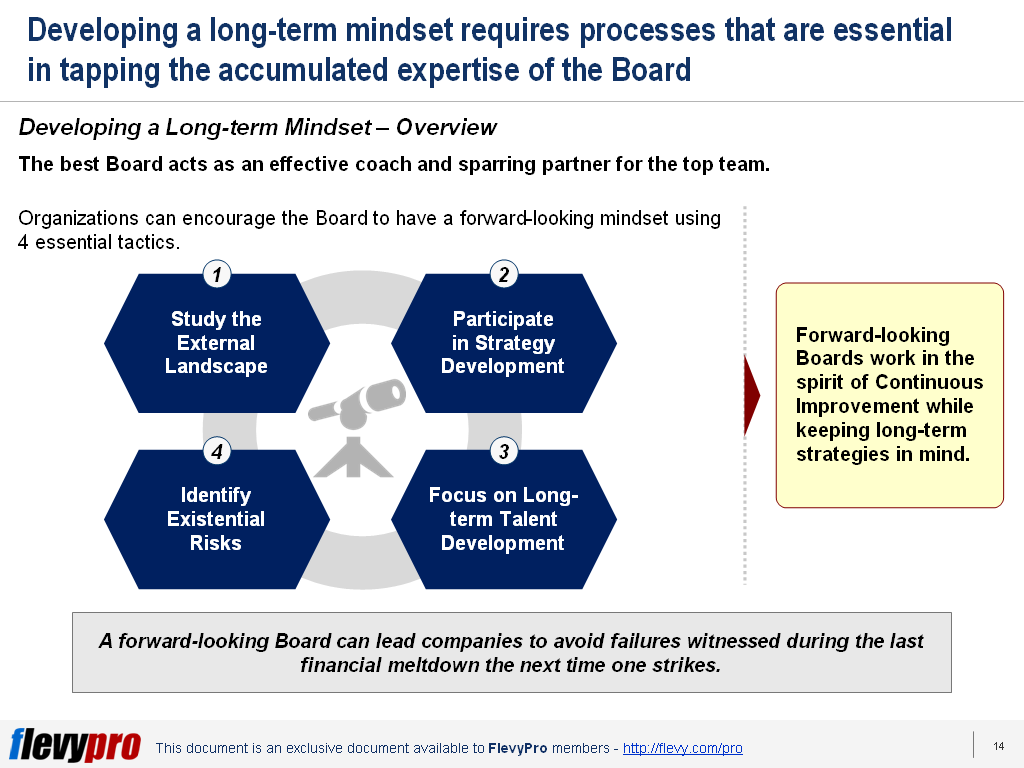When things go wrong on a grand scale, often we direct our attention to the role of the Board. Debate exudes and often gets heated up and intensifies. This often happens when the Board spends more time looking in the rearview mirror and not enough scanning the road ahead. When this happens, governance suffers.
and intensifies. This often happens when the Board spends more time looking in the rearview mirror and not enough scanning the road ahead. When this happens, governance suffers.
Often, the Board of Directors spend a bulk of its time on quarterly reports, audit reviews, budgets, and compliance. However, with the change in the business environment, there is a greater need to redirect the Board’s attention on matters crucial to the future prosperity and direction of the business. One of this is Strategy Development. Achieving this requires the development of a dynamic Board with a long-term mindset capable of creating forward-looking agenda and activities that get sufficient time over a 12-month period.
The Changing Board Agenda
The Board Agenda is changing. It is becoming more dynamic and it has increasingly highlighted forward-looking activities. Long-term economic, technological, and demographic trends are radically shaping the global economy. The second Industrial Revolution now requires the Board to shift focus. The Board is now challenged to focus on matters crucial to achieving Operational Excellence and the future direction of the organization. Directors must devote more time to strategic and forward-looking aspects of the agenda. They must cease seeing the job as supporting the CEO, but instead, be strategic in making sure long-term goals are formulated and met.
Having a forward-looking Board has now become every organization’s imperative. However, this can only be achieved if there is a solid foundation that is anchored on three guiding principles. Organizations must have the right Board Member, a clear definition of the Board’s role, and greater time commitment from members. At this time when a long-term mindset has come to a fore, these have become essential.
Developing a Long-term Mindset: The 4 Essential Tactics
“Strategy without tactics is the slowest route to victory. Tactics without strategy are the noise before defeat.” - Sun Tzu
Organizations can undertake 4 essential tactics to encourage the Board to have a long-term mindset.
- Study the External Landscape. This is the starting point of creating a forward-looking mindset. The primary purpose of this tactic is to expose the Board to new technologies and market developments relevant to the company’s strategy. Studying the external landscape will challenge management with critical questions.
- Participate in Strategy Development. This tactic focuses on making strategy a vital part of the Board’s DNA. Participating in the Strategy Planning process will strengthen the Board’s role in co-creating and ultimately agreeing on the company’s strategy.
- Focus on Long-term Talent Development. The third tactic, this tactic focuses on unleashing the full power of the people. It will effectively reallocate skills and experience to a business with more potential. To achieve its expected result, the key is the Board must agree with management on a sensible approach to reviewing executive talent.
- Identify Existential Risks. This is the tactic that focused on the Risk Management of existential risks. Because of accelerating technological progress, existential risks have become a recent phenomenon. Existential risks have a great detrimental impact not only on business but also on mankind. The Boards have the duty to ensure that management teams pursue bottom-up investigations, identify key risk areas, and act on the results.
The 4 tactics are essentially effective in creating long-term mindsets. When this is achieved, Board Excellence is never far behind.
Interested in gaining more understanding of achieving Board Excellence via a Long-term Mindset? You can learn more and download an editable PowerPoint about Board Excellence: Long-term Mindset here on the Flevy documents marketplace.
Are you a management consultant?
You can download this and hundreds of other consulting frameworks and consulting training guides from the FlevyPro library.
Comments